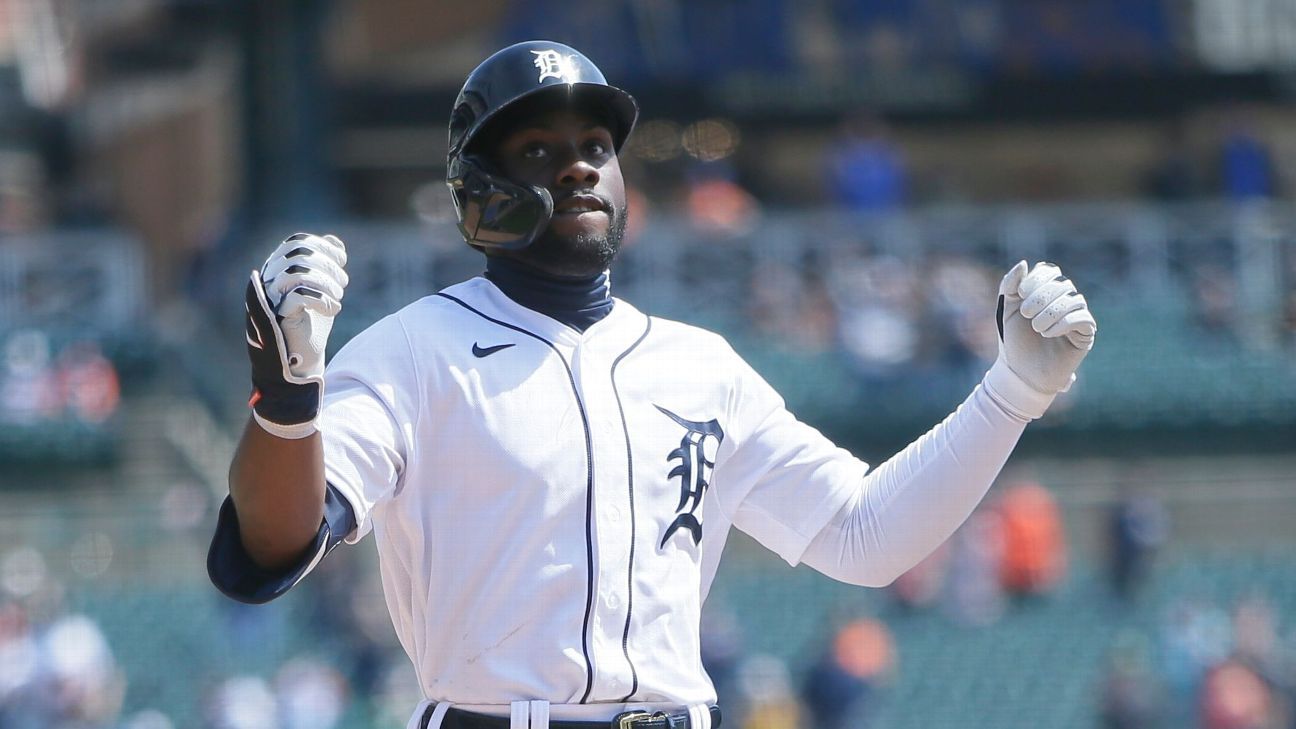Akil Baddoo felt like he’d lived this moment before.
When the Minnesota Twins decided Baddoo wasn’t worth protecting on their 40-man roster and the Detroit Tigers quietly took the outfielder in the Rule 5 draft in December, his mom, Akilah, made a point of it.
“Do you remember them questioning you?” she asked her son. “Do you remember that feeling in high school when they didn’t trust you and they had you batting eighth or ninth? Doesn’t this feel like deja vu?”
“Yep,” her son responded.
“What did you do?” Akilah asked.
“I played ball,” he said.
While there are certainly Rule 5 draft success stories — such as Roberto Clemente, Johan Santana, Dan Uggla and Shane Victorino — most fail to make any impact at the major league level for their new teams after this less-than-prestigious designation. But in Baddoo’s opening week with Detroit, the 22-year-old who’d never played above Single-A ball became the first player in modern major league history with a grand slam, a home run and a walk-off hit in his first three MLB games.
“It’s kind of that feeling like, you’re a new guy in town,” Baddoo said. “Wanting to prove yourself all the time, having to prove yourself and realizing you don’t really have to do too much.”
Growing up on the travel baseball circuit, Baddoo always played up a level. When Baddoo turned 9, his parents enrolled their son to play with the 10-year-olds to challenge him, and that continued his entire youth baseball career.
Before the Tigers selected him in the Rule 5, Baddoo had not played a competitive baseball game since 2019, spent the 2020 season rehabbing from Tommy John surgery and had never played a game above High-A after the Twins selected him in the second round of the 2016 MLB draft out of Sale High School in Conyers, Georgia.
Now presented the opportunity to make a big league roster in spring training, he channeled the energy from his childhood, the confidence that allowed him to play up with the bigger, older kids.
Within his first few games, Baddoo made sure he didn’t end up among the litany of forgotten Rule 5 picks.
“The Tigers saw something in me and I’m truly thankful for that,” he said. “What they saw in me is something I always had inside of me. I have this chip on my shoulder, and that’s the mentality that I had throughout the offseason and throughout the Rule 5. I was like, ‘Well, now I’m a big leaguer, so let’s prepare like a big leaguer and show everyone that you’re there to belong.'”
During his time in the Twins organization, Baddoo hit .249/.357/.422 with 86 extra-base hits in 233 games, striking out in 24% of his plate appearances in 2018 and 29.8% in 2019. While Baddoo projected as a borderline top-10 prospect in the organization, Minnesota’s organizational outfield depth, including Alex Kirilloff, Trevor Larnach, Gilberto Celestino and Brent Rooker, led to the organization leaving Baddoo unprotected in the Rule 5 draft, free for any team to select.
The Tigers swooped in with the third pick. Now, with a fresh opportunity, Baddoo upped his training regime, continuously working on his swing with an instructor, working on his speed and agility twice a week and working out six days a week.
“It’s like that little kid who’s sitting there waiting to get in and is like, ‘Coach, can I get in?'” Akilah said. “He channelled it into something totally different. To make him feel like, ‘When I get out there, I’m going to take advantage of every opportunity I get.'”
The first opportunity to make an impression came on Opening Day, when Baddoo stepped up to the plate with his family watching from the stands. During warm-ups that day, both Akilah and his father, John, noticed their son’s sense of calm.
“That is him, chill and calm,” Akilah said. “That personality. He has his own little swag.”
As their son stepped up to the plate at Comerica Park in the third inning against Cleveland pitcher Aaron Civale to take his first crack at a major league pitch, John and Akilah turned to each other.
“We picked spots in the outfield where he would hit it at,” John said. “I picked a pull to the right. She picked an oppo ball.”
Baddoo received an 89 mph fastball from Civale on the outer half of the plate and took a crack, sending the baseball over the right-field fence and into the bullpen, emphatically flipping his bat in the process with the confidence of a 10-year veteran. As he circled the bases, Baddoo celebrated by shooting an imaginary bow-and-arrow and pointing toward his family.
As John and Akilah celebrated, they settled on the prize for their bet.
“Bragging rights,” John said.
“Just the knowledge that I’m always right,” Akilah said. “Just to note once again, Mom’s always right.”
Baddoo knew the high of the first two weeks of his major league debut wouldn’t last. He plans to launch an NFT (nonfungible token) through Blockparty to celebrate his early success, with proceeds going toward RBI Baseball in Detroit and the Rise Foundation. Through his first eight major league games, nobody in American League history posted a higher OPS (1.443). But in his most recent series, Baddoo didn’t get a hit in 11 at-bats against the Oakland Athletics, striking out eight times. To get through his rough stretch, Baddoo acknowledged he needs to maintain the confidence that allowed him to make the jump from High-A to the majors.
“It’s baseball — there’s going to be ups and downs,” Baddoo said. “You got to stay even, killing it and ride the wave. It’s baseball. Just overcome it and continue to play your game and don’t lose sight of that.”
As adversity strikes again, his mom will be right there to remind him that he has lived it all before.
